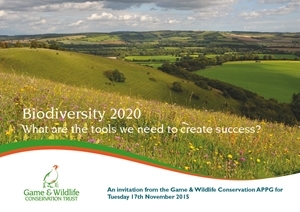 Discussion on the future for biodiversity and the tools needed to increase wildlife in our countryside. This included the use and benefits of legal predator control and adaptive management approaches to conservation.
Discussion on the future for biodiversity and the tools needed to increase wildlife in our countryside. This included the use and benefits of legal predator control and adaptive management approaches to conservation.
Mike Short from the GWCT’s Predation Research team said: “It isn’t just better habitats that we need to restore. It’s a restoration in the wider use of well-researched wildlife management tools, such as traps and snares. The GWCT has invested a huge amount of time and effort in improving the selectivity and welfare impacts of predator control practices. For example, when fox snares designed to allow non-target species to self-release, are used in accordance with ‘best practice’ guidelines, they have been shown to pass internationally recognised trap welfare standards, although it’s critical that operators are properly trained in their use.”
The Secretary of State paid tribute to the scientific research by the Game & Wildlife Conservation Trust and its contribution to developing practical solutions to reversing the decline of our native wildlife. The Minister highlighted the importance of game conservation including best practice predator control, as one of the many tools which can aide species recovery.
The GWCT has noted a number of challenges in halting the loss of biodiversity, including the spread of non-native species. Through our research we have demonstrated effective and practical ways of reversing the decline of some species, which includes improved habitat measures, supplementary feeding during the winter months and the legal control of common predators like fox and carrion crow. Research has clearly demonstrated that legal predator control, in conjunction with the provision of good habitat, can have a significant benefit on species recovery, as clearly shown by the Duke of Norfolk’s inspiring Peppering Partridge Project on the South Downs. Here, there has been a dramatic recovery of a whole suite of nationally declining farmland bird species, such as our native wild grey partridge, lapwing and skylark.
It is clear from discussions with parliamentarians, land managers and conservation organisations that the legal management of predation pressure during the breeding season will play a critical role in securing the recovery of some species, thereby contributing to the UK’s strong desire to meet its 2020 biodiversity targets.
Speakers
- The Rt. Hon Elizabeth Truss MP, Secretary of State for the Environment, Food and Rural Affairs
- The Duke of Norfolk
- Mike Short, Ecologist, GWCT Predation Research team